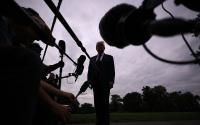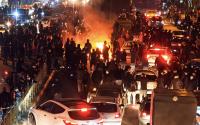Tuesday February 1, 2005The Guardian If the Arab world were to be placed in a psychiatrist's chair, its emotions in the wake of Iraq's elections would probably be described as conflicted.
The Arab regimes adopted a cautious "wait and see" attitude yesterday as the votes were counted. But they fear that Iraq's induction into representative politics, which they supported in theory, could yet backfire on them.
For most regional governments, stability in Iraq is the overriding concern. Egypt's president, Hosni Mubarak, spoke for many when he said he hoped the elections "will lead to a process in which all ... Iraqis participate and open the way for the restoration of calm".
Turi Munthe, a Middle East expert at the Royal United Services Institute, said: "Continuing violence in Iraq does not serve anybody's purposes in the region. The partial success of the elections is probably seen to some extent as positive. All the region's governments are worried about civil war."
But pro-western "moderates" such as Saudi Arabia and Jordan remain more concerned about their own problems with Islamist violence, even though there is clearly an Iraq connection.
Recent weeks had seen an upsurge in al-Qaida attacks in Kuwait. And security clampdowns had induced Saudi militants to transfer operations to Iraq, said Rime Allaf, a senior specialist at the Chatham House thinktank.
Yet broader fears that the advent of a Shia-dominated government in Baghdad, directly or indirectly backed by Iran, would foment tensions among Sunnis and Shias in Saudi Arabia, Syria or Bahrain were exaggerated, Ms Allaf said.
"The Iranians in fact have been very disciplined. There's been too much talk about a Shia 'crescent'. It won't happen."
Like other Arab leaders, Mr Mubarak's new-found enthusiasm for inclusive democracy in Iraq sits uneasily with his policy at home, where he has dominated for 24 years.
The Egyptian parliament is expected to nominate him in May as sole candidate for another six-year term. But in an echo of recent turmoil in eastern Europe, a street-level movement called Enough is trying to stop Mr Mubarak standing again or installing his son, Gamal, as his successor.
And despite their reliance on a US security umbrella, Arabs were generally more concerned about democracy being imposed by force in Iraq than the lack of it at home, Mr Munthe said.
"Egyptians genuinely feel ideological outrage about the US invasion of Iraq. They see it as a neo-imperial exercise. The elections can't be used as an example because they are too tarnished by America's touch."
Ms Allaf agreed: "The idea that democracy is going to spread through the Middle East as a result of these elections is, to put it mildly, highly unlikely.
"Everyone in the region has been very cynical. They say, 'Yes, it's very nice to see these Iraqis voting.' But let's be realistic. This was an election under occupation and most people didn't even know who they were voting for."
"The regimes were much more worried in March 2003 [when Iraq was invaded]. They don't believe there will be a democratic domino effect now."
Two regional states with reasons to feel most positive about Iraq's elections are Israel, a lone democracy and Washington's principal ally, and Iran, which hopes old enmities with Iraq will fade.
Turkey possibly has most cause for immediate alarm. It suspects that the Kurdish push for autonomy is leading towards independence. That could destabilise south-east Turkey.
Ankara has already said it will not tolerate Kurdish control of the oil centre of Kirkuk. And Turkey's foreign minister, Abdullah Gul, hinted yesterday at military intervention.
In a prime example of conflicted thinking that may strike Iraq's newly-elected leaders as ironic, Mr Gul suggested Turkey might resort to force because "in democratic countries, governments don't have the luxury of ignoring public sentiment".





